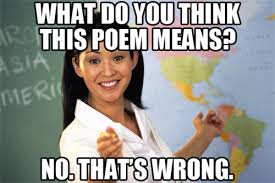Blog #4
 (This is exactly how I feel with transcribing poetry)
(This is exactly how I feel with transcribing poetry)
I guess I hadn’t really thought about digital literacy being a sponsor, but it makes sense how it can be one after reading Keri’s post. Thinking back to the days when I started using MySpace and eventually Facebook, I had to learn what the norm for each of those social media sites was as well. While the format for each of those sounds much simpler than Twitter, learning how to blend in with the rest of a social media crowd is definitely a learning experience. I’m just glad my learning of each site wasn’t as complicated as learning the Twitter lingo and symbols.
Learning from others examples, asking questions, checking out different/associated links to a new literacy site is a sponsor, which I wouldn’t have thought if I had just been told that, but Keri’s post helped me realize that it is. As we learned from Brandt’s first article we read “Sponsors…are any agents…who enable, support, teach, model as well as recruit…or withhold literacy —and gain advantage by it in some way”. Her story is a great representation of that definition; she used an agent, Twitter and Thomas, who both supported her to branch out and open her opportunities, they both taught her how to utilize tools/symbols to blend in with the group, and she gained an advantage by not only joining a new online society, but helped her spread the word and get in touch with other colleagues of hers to share important information she needed. If her story doesn’t inspire the idea that digital literacy can be a sponsor, than I don’t know what else would.
This is a very similar form of print-based sponsors. Looking at the definition of sponsors, I can see how both print and digital literacy can fit in the same category. A great example that comes to mind for print-based sponsors is text books. As all students are aware, text books contain LOTS of information that are teaching us concepts to utilize in whatever subject we are learning. For example, chemistry books are going to teach you what chemicals to use to create certain compounds (or whatever they teach you in those books, I’ve never taken Chem.); Math books are going to teach you how to work through difficult equations, etc. The text books (and professors) are the agents, and we are the vehicle that retains the information we are learning and applying where needed. Sponsors are all around us, without us even realizing it.

 Website:
Website: